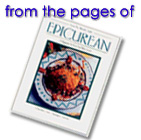
If you're a lover of fiction, you're probably aware of Jay McInerney, who made his name with his brilliant debut novel, Bright Lights, Big City (later turned into a film starring Michael J. Fox), about the unraveling life of a cocaine snorting young writer in New York City. With the proceeds from his successful first novel, he was able to indulge in better wines than he was able to purchase as a poor student and starving writer. This, by the way, must be testimony to the fictional nature of Bright Lights, Big City, for as any coke fiend knows, sniffing that white powder will ruin the membranes in your nose and take away the olfactory pleasures of wine. Of course that's not a foolproof test. In fact, I know of one Napa Valley winemaker in the '80's, who shall remain anonymous, who always sniffed his glass with his head tilted to one side - he reserved one nostril for coke, the other for wine.
McInerney's career continued with the publication of Ransom; Story of My Life, and Brightness Falls. In the meantime, his friend Dominique Browning became the Editor-in-Chief of Conde Nast's House and Garden magazine, and knowing of McInerney's love of fine wine, invited him to write a regular wine column for the magazine, called "Uncorked." All but one of the 48 essays here combined are from that column; the other is from The New Yorker.
These are well-written, mostly anecdotal essays about wine and wine personalities in Europe and the U.S. It's a cliché that wine writers are snobs who write "purple prose." The idea is probably a holdover from wine books of the 1930's and '40's. You may remember the James Thurber cartoon from 1937, in which the dinner host announces, "It's a naïve domestic Burgundy without any breeding, but I think you'll be amused by its presumption." In fact, such pretentious wine writing went by the wayside at least 30 years ago.
McInerney doesn't pretend to be a technical wine writer. "My initial lack of expertise was, I hope, compensated by a new set of metaphors and similes that I brought to wine writing," he explains. As these columns attest, he writes an entertaining column with a good deal of humor. Does his novelist's training make for better writing than Gourmet's Gerald Asher, or Bon Appètit's Anthony Dias Blue? No, but says McInerney, "I try to use my strengths as a fiction writer; I like to do character sketches of the people in the wine business." His own personality and enthusiasm of discovery are also projected on the page. It's refreshing to hear him say that "after almost five years of writing about wine, I feel less confident of my grasp of the subject than I did when I began. But I think that on the day I feel confident in my expertise, I'll stop writing about it." On days when his ficiton writing isn't working for him, he turns to his next wine column. It's a venue that puts him in contact with a host of interesting people, he admits. "The wine world is a lot less bitchy than the literary world. Food and wine attract genial sort of people."
By the end of the book, which you can easily read at one sitting, you feel that you'd like to invite McInerney into your home to share a bottle or two. You might even be compelled to take out a subscription to House and Garden.
|

